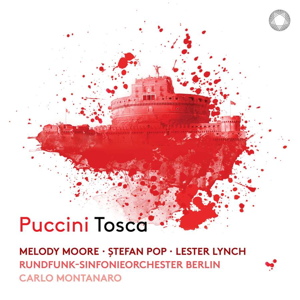
Giacomo Puccini (1858-1924)
Tosca (1900)
Floria Tosca: Melody Moore (soprano)
Mario Cavaradossi: Ștefan Pop (tenor)
Scarpia: Lester Lynch (baritone)
Kinderchor der Deutschen Oper Berlin, Rundfunkchor Berlin, Rundfunk-Sinfonieorchester Berlin/Carlo Montanaro
rec. 2022, Haus des Rundfunks, Berlin, Germany
Libretto with English translation available online
Reviewed as download from press preview
Pentatone PTC5187055 SACD [2 discs: 109]
In his invaluable series of surveys of recordings of the standard repertoire, Ralph Moore has an entry titled “The Untouchables” – recordings that by (almost) common consent have been established as benchmarks. When it comes to Tosca it is the early 1950s recording conducted by Victor de Sabata and with Maria Callas, Giuseppe di Stefano and Tito Gobbi in the leading roles, which gets the laurel. It is a mono recording but in the Pristine Ambient Stereo reprocessing it is fully comparable with later genuine stereo versions – and there are quite a few of them in the market. I’m not quite sure when we last had a new studio recording of this score, but here Pentatone, who have amended the catalogue quite considerably the last few years, have come up with a brand new version. Can it challenge the established favourites?
Technically it certainly can. Pentatone’s sound engineers have rightly been hailed for their state-of-the-art sonics, and even though my listening equipment is far from high end – I mostly prefer headphones – I judge the sound here to be admirable in every way. The choral and orchestral forces of the Berlin radio are well merited, and the Italian maestro Carlo Montanaro has specialised in Italian repertoire for more than 20 years. This Tosca is free from idiosyncrasies and other surprises and is delivered in workmanlike fashion, which is a merit in itself.
As for the singing I was pleased to encounter the Romanian tenor Stefan Pop – a former First Prize Winner of the Operalia Competition in 2010. I saw and heard him as an excellent Alfredo in La traviata in Hamburg ten years ago, and he has retained his beautiful lyrical voice and added enough heft to manage Cavaradossi’s cries of Vittoria! Vittoria! in the second act. He handles the set pieces in the first and last act with elegance and is at his very best in O dolci mani, sung lovingly. I hailed Melody Moore’s recent tribute to Renata Tebaldi (review) and proposed her “as a worthy inhabitant in the Pantheon of the present generation of sopranos”. Here, in one of Tebaldi’s great roles, which she recorded twice, she proves that the accolade was justified. In the first act, she depicts the amorous lover who becomes jealous when she suspects a rival in Countess Attavanti with glow and flashing eyes, in the second act, she vacillates between fear of and disgust towards Scarpia and sings the most touching and emotional Vissi d’arte imaginable. The joy when she shows Cavaradossi the safe conduct in the last act is still mixed with the fear that even after his death Scarpia could fool her, which is confirmed when Cavaradossi’s supposedly fake death turns out to be real. All this is so convincingly moulded with vocal means alone – and gloriously sung – that it must be regarded as one of the greatest interpretations ever recorded.
Unfortunately Lester Lynch’s Scarpia is monochrome and unsteady. I know that he has received rave reviews, but I have never been able to appreciate his singing. His timbre is suitable for evil characters, but those must also be performed with flexibility to be interesting. Scarpia must have some sexual allure, which singers like Tito Gobbi and Giuseppe Taddei have in abundance in their respective recordings. Of the minor roles Kevin Short is a straightforward Angelotti, while Alexander Köpeczi is an unusually serious Sacristan, avoiding the clownish parodies that some singers indulge in.
The sum of all this is: stick to the untouchable de Sabata, preferably in Pristine’s restoration, or, if you must have genuine stereo, choose Leinsdorf (with Milanov, Björling and Warren – also on Pristine), Molinari-Pradelli (with Tebaldi, Del Monaco and George London – Decca), Karajan (with Leontyne Price, di Stefano and Taddei – also Decca) or Colin Davis (with Caballé, Carreras and Ingvar Wixell – originally Philips, now Decca) depending on your preference of singers. I have a soft spot for Colin Davis and the underrated Wixell, who was a marvellous Scarpia – I heard him several times in the role in Stockholm in the 1970s but all lovers of great singing should also listen to this Pentatone issue for the sake of Melody Moore’s superb portrait of Tosca and Stefan Pop’s lyrical Cavaradossi.
Göran Forsling
Help us financially by purchasing from


Other cast
Angelotti: Kevin Short (bass)
Spoletta: Colin Judson (tenor)
Sacristan: Alexander Köpeczi (bass)
Sciarrone: Georg Streuber (baritone)
Jailer: Axel Scheidig (bass)
Shepherd boy: Lean Miray Yüksel (soprano)


















